

You see a duck or a rabbit? What do you see?

A duck or a rabbit? This is a well known optical illusion which can be seen in two ways, either as a rabbit, or as a duck. The surprising origins of 'post-truth' – and how it was spawned by the liberal left. “Post-truth” has been announced as the Oxford Dictionaries’ international word of the year.

It is widely associated with US president-elect Donald Trump’s extravagantly untruthful assertions and the working-class people who voted for him nonetheless. Daniel Dennett on Tools To Transform Our Thinking. Karl Popper. Popper bust in the Arkadenhof of the University of Vienna Sir Karl Raimund Popper CH FBA FRS[9] (28 July 1902 – 17 September 1994) was an Austrian-born British[10] philosopher, academic and social commentator.[11][12][13] One of the 20th century's most influential philosophers of science,[14][15][16] Popper is known for his rejection of the classical inductivist views on the scientific method in favour of empirical falsification.
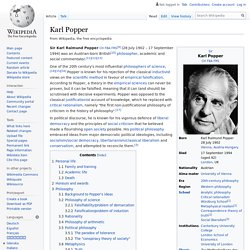
Aristotle. Aristotle's views on physical science profoundly shaped medieval scholarship.
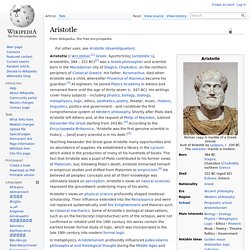
Their influence extended into the Renaissance and were not replaced systematically until the Enlightenment and theories such as classical mechanics. Some of Aristotle's zoological observations, such as on the hectocotyl (reproductive) arm of the octopus, were not confirmed or refuted until the 19th century. His works contain the earliest known formal study of logic, which was incorporated in the late 19th century into modern formal logic. His ethics, though always influential, gained renewed interest with the modern advent of virtue ethics. Galileo Galilei. Italian polymath Galileo di Vincenzo Bonaiuti de' Galilei (Italian: [ɡaliˈlɛːo ɡaliˈlɛi]; 15 February 1564 – 8 January 1642) was an Italian astronomer, physicist and engineer, sometimes described as a polymath, from Pisa.[3] Galileo has been called the "father of observational astronomy",[4] the "father of modern physics",[5][6] the "father of the scientific method",[7] and the "father of modern science".[8] Galileo's championing of heliocentrism (Earth revolving around the sun) and Copernicanism (Earth rotating around the sun) met with opposition from within the Catholic Church and from some astronomers.
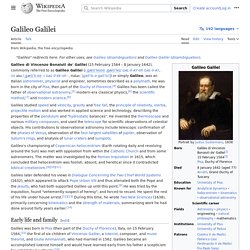
The matter was investigated by the Roman Inquisition in 1615, which concluded that heliocentrism was foolish, absurd, and heretical since it contradicted Holy Scripture. Isaac Newton. Influential British physicist and mathematician Sir Isaac Newton PRS (25 December 1642 – 20 March 1726/27[a]) was an English mathematician, physicist, astronomer, theologian, and author (described in his own day as a "natural philosopher") who is widely recognised as one of the most influential scientists of all time and as a key figure in the scientific revolution.
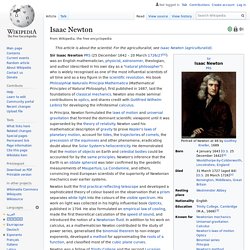
His book Philosophiæ Naturalis Principia Mathematica (Mathematical Principles of Natural Philosophy), first published in 1687, laid the foundations of classical mechanics. Newton also made seminal contributions to optics, and shares credit with Gottfried Wilhelm Leibniz for developing the infinitesimal calculus. Life Early life. Guglielmo Marconi. Guglielmo Marconi, 1st Marquis of Marconi (Italian: [ɡuʎˈʎɛlmo marˈkoːni]; 25 April 1874 – 20 July 1937) was an Italian inventor and electrical engineer known for his pioneering work on long-distance radio transmission[1] and for his development of Marconi's law and a radio telegraph system.
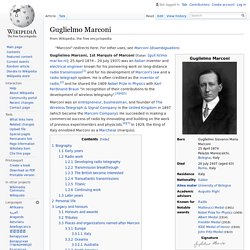
He is often credited as the inventor of radio,[2] and he shared the 1909 Nobel Prize in Physics with Karl Ferdinand Braun "in recognition of their contributions to the development of wireless telegraphy".[3][4][5] Pythagoras. 6th century BC Ionian Greek philosopher and mystic Pythagoras of Samos[a] (c. 570 – c. 495 BC)[b] was an ancient Ionian Greek philosopher and the eponymous founder of Pythagoreanism.
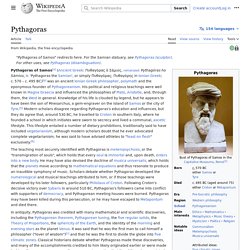
His political and religious teachings were well known in Magna Graecia and influenced the philosophies of Plato, Aristotle, and, through them, Western philosophy. Knowledge of his life is clouded by legend, but he appears to have been the son of Mnesarchus, a gem-engraver on the island of Samos. Modern scholars disagree regarding Pythagoras's education and influences, but they do agree that, around 530 BC, he travelled to Croton in southern Italy, where he founded a school in which initiates were sworn to secrecy and lived a communal, ascetic lifestyle. Thales. Thales of Miletus (; Greek: Θαλῆς (ὁ Μιλήσιος), Thalēs, THAY-lees or TAH-lays; c. 624/623 – c. 548/545 BC) was a Greek mathematician, astronomer and pre-Socratic philosopher from Miletus in Ionia, Asia Minor.

He was one of the Seven Sages of Greece. Many, most notably Aristotle, regarded him as the first philosopher in the Greek tradition,[1][2] and he is otherwise historically recognized as the first individual in Western civilization known to have entertained and engaged in scientific philosophy.[3][4] In mathematics, Thales used geometry to calculate the heights of pyramids and the distance of ships from the shore.
He is the first known individual to use deductive reasoning applied to geometry, by deriving four corollaries to Thales' theorem. He is the first known individual to whom a mathematical discovery has been attributed.[6] The 8 Elements of The Critical Thinking Process. April 3, 2014 You ask any teacher about the skills they want their students to develop and critical thinking will be among the first cited skills.

So what is critical thinking all about ? A Quick Guide to 21st Century Critical Thinking Skills for Educators. Playing: Words. People - Charles Fernyhough. Charles Fernyhough appears in the following: Voices in Your Head Tuesday, September 07, 2010 By Radiolab In this podcast, Jad talks to Charles Fernyhough about the connection between thought and the voice in your head.
How did it get there? Read More ListenAddDownload Words that Change the World Susan Schaller believes that the best idea she ever had in her life had to do with an isolated young man she met one day at a community college. Words. The hard problem. “I THINK, therefore I am.” René Descartes’ aphorism has become a cliché. But it cuts to the core of perhaps the greatest question posed to science: what is consciousness? The other phenomena described in this series of briefs—time and space, matter and energy, even life itself—look tractable. They can be measured and objectified, and thus theorised about. Consciousness, by contrast, is subjective. David Cain. Dan Dennett: Dangerous memes. Sheena Iyengar: How to make choosing easier. Jon Haidt's Home Page. Friedrich Heinrich Jacobi. Friedrich Heinrich Jacobi (25 January 1743 – 10 March 1819) was an influential German philosopher, literary figure, socialite, and the younger brother of poet Johann Georg Jacobi.
He is notable for coining the term nihilism and promoting it as the prime fault of Enlightenment thought particularly in the philosophical systems of Baruch Spinoza, Immanuel Kant, Johann Fichte and Friedrich Schelling.[1] Instead of speculative reason, he advocated Glaube (variously translated as faith or "belief") and revelation. In this sense, Jacobi anticipated present-day writers who criticize secular philosophy as relativistic and dangerous for religious faith. Le Temps Imaginaire. Frank Smith, docteur en épistémologie, est l’auteur d’une thèse intitulée : les enjeux politiques de la vulgarisation scientifique. Il analyse l’évolution des rapports entre l’expérience et la science pour ensuite envisager la vérité scientifique à la lumière des différentes lectures possibles des inégalités de Heisenberg.
Les théories scientifiques ne sont-elles que des inventions de l’esprit humain libre d’interpréter les faits à sa guise ou relèvent-elles d’une réalité objective qui serait découverte ? Dès lors, sommes-nous réduits à l’alternative qui consiste à faire de la science un argument d’autorité ou, étant donné le caractère nécessairement provisoire des théories, à leur dénier toute prétention à décrire la réalité ? Il est traditionnel d’opposer la vérité aux interprétations. Cette opposition est aussi celle de l’unicité et de la multiplicité. D’abord, la première chose que l’on peut noter est qu’il est déjà arrivé que la science se soit trompée. William James. William James (January 11, 1842 – August 26, 1910) was an American philosopher and psychologist who was also trained as a physician. The first educator to offer a psychology course in the United States,[2] James was one of the leading thinkers of the late nineteenth century and is believed by many to be one of the most influential philosophers the United States has ever produced, while others have labelled him the "Father of American psychology".[3][4][5] Along with Charles Sanders Peirce and John Dewey, he is considered to be one of the greatest figures associated with the philosophical school known as pragmatism, and is also cited as one of the founders of the functional psychology.
He also developed the philosophical perspective known as radical empiricism. James' work has influenced intellectuals such as Émile Durkheim, W. E. B. Early life[edit] The divide between the unconscious and... - Michael Thomas Gerety. Pragmatic theory of truth.